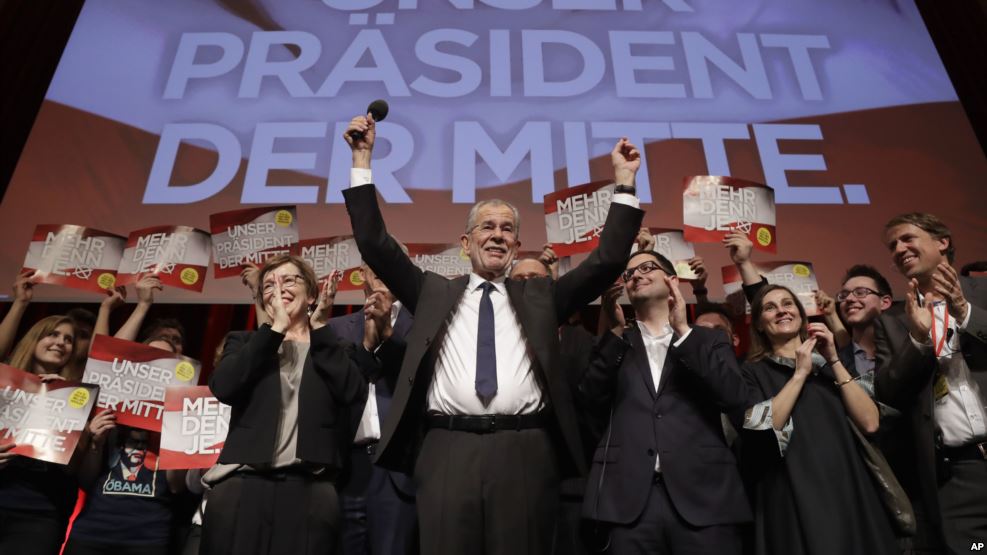Austria Defeats Far Right in Presidential Polls: A Blip Or More?

NEW DELHI: The 2016 Austrian presidential election was eyed by many countries as a possible turn of tables in the wake of the recent resurgence of the Far right, both in Europe and outside. The far right Freedom Party’s Robert Nofer conceded defeat in a narrowly contested election in which the Austrian Green party candidate, Alexander Van Der Bellen emerged victorious.
According to polls, Van Der Bellen had secured 53.4% of the votes, putting to bed the possibility of a first Far-right leader since the Second World War. This result did come as a bit of a shock, as a lot expected Nofer to win by a clear margin. There was further cause of optimism given the recent triumph of Donald Trump in the United States, and the UK famously exiting the EU. "I am incredibly sad it didn't work out," Hofer wrote in a concession statement on Facebook.
The Presidential election became all the more important in the European context as Nofer, during his Presidential campaign had indicated that he would be open to Austria voting for a referendum regarding its position in the EU.
There is no denying that since Austria joined the EU, its economy has grown significantly. Some 70% of Austria’s foreign trade is with EU member states. But it’s not without complications.
Ever since the “poor” Eastern European countries joined the EU, the net GDP of western countries, like Austria, have gone down. This has also resulted in workers getting significantly lower wages than before.
This rise of Far right politicians and their overwhelming support mostly stems from the incompetence of the EU in failing in its obligations, both economic and political.
Nofer is also strictly anti-immigration, and a staunch nationalist. He was quoted saying that carrying guns is a “natural consequence” of immigration. Last year, the refugee crisis added almost 90,000 migrants to Austria’s population of roughly 8.6 million.
Although, Austria still welcomed refugees, there was a general feeling of uneasiness and contempt in certain parts of the country. Some blamed the EU for letting the situation get out of hand. Some blamed the Government saying that Austria’s economy couldn’t handle such a mass influx of refugees. The fear became more evident, when gangs of migrants sexually abused women on New Year’s Eve in Cologne. By the end of 2015, Austria had closed its borders.
One could begin to see a stark difference from what Austria, as a nation stood. It was previously seen as a country which always welcomed its neighbours. It opened its borders famously during the Hungarian uprising in 1956, and once again during the Balkan War of 1995. James Michener famously stated in his book, The Bridge at Andau, “If I am ever required to be a refugee, I hope to make it to Austria.”
The emergence of Nofer was seen by many as a revolution to upset the status quo that existed.
He has also been spotted wearing the blue cornflower, which is an old Nazi symbol that resonates with the idea of pan-Germanism. It resonates with the idea of a “Greater Germany” which the Nazi doctrine was based on, and which consequently led to the Second World War.
This recent insurgence of these Far right leaders has trickled down to the rest of Europe as well. Most famously, the rise of the UKIP in Britain, which ended up voting for Brexit. France isn’t far behind either, with Presidential candidate Marine Le Pen, the leader of France’s Front National, taking on Twitter to cheer on the Austrian Freedom Party.
The Netherlands also seems to follow suit, with Geert Wilders, the leader of the Party for Freedom(PVV) conjuring a wave of support from the Dutch faithful, with its elections due in March. The rise of PEGIDA in Germany has also caught the eye of many prominent world leaders. This has unsettled Europe, as their strong anti-Muslim, anti-immigrant policies is slowly gaining ground.
Despite the loss of Nofer in the Austrian Presidential elections, the continual rise of the right wing faction has left many leaders and social activists perturbed. Sigmar Gabriel, the German vice-chancellor was quoted saying, “A load has been taken off the mind of all of Europe”. It was “a clear victory for good sense against right-wing populism”, he added.
This continuous upheaval of the Right wing faction has risen to prominence in the past few years, and is steadily garnering support. Could this be the end of the liberal and moderate ideologies that have been the face of Europe for so long, or is it just a blip which will fade out with time? The question yet remains to be answered.



